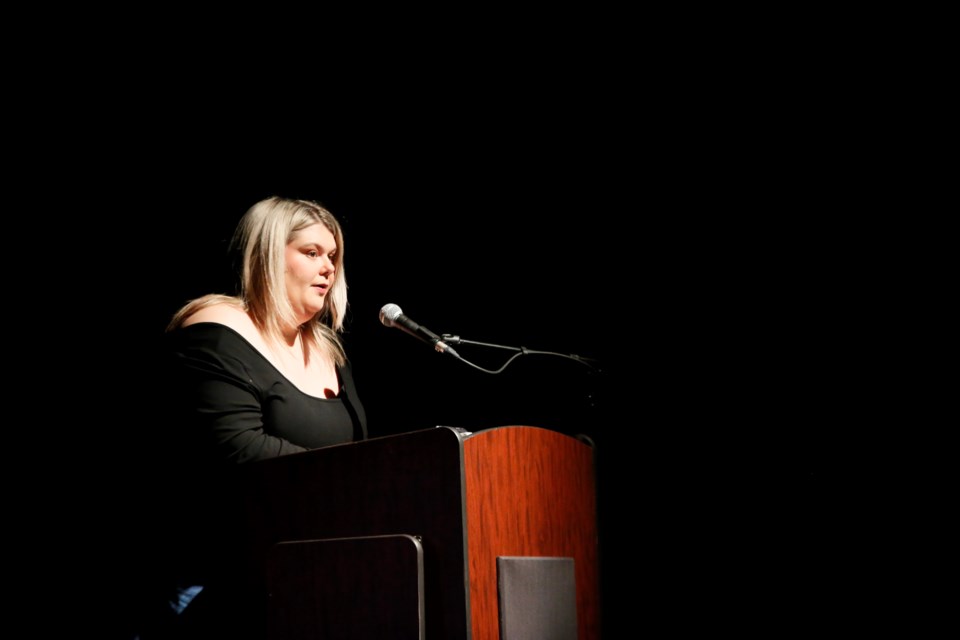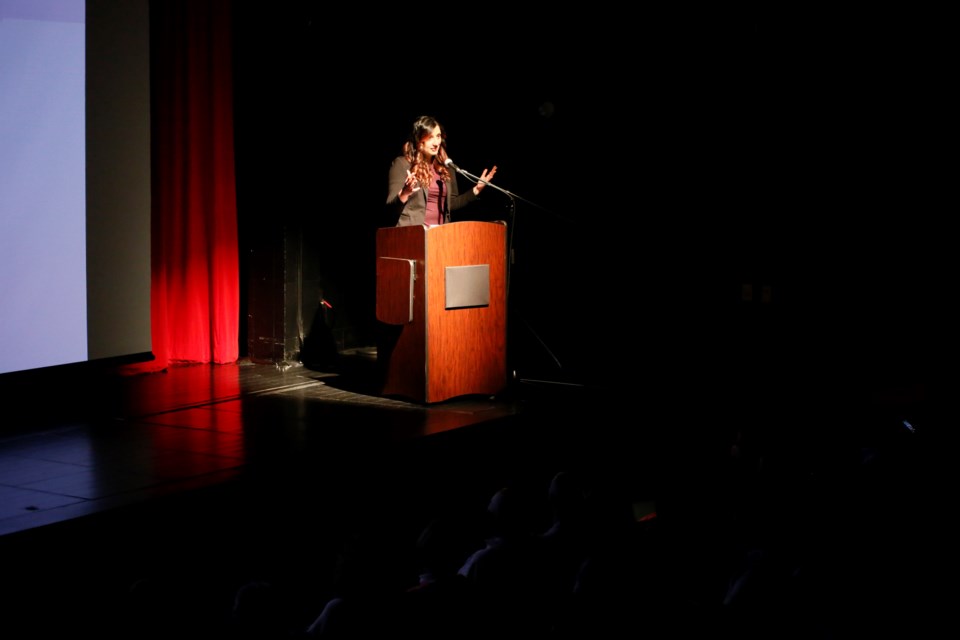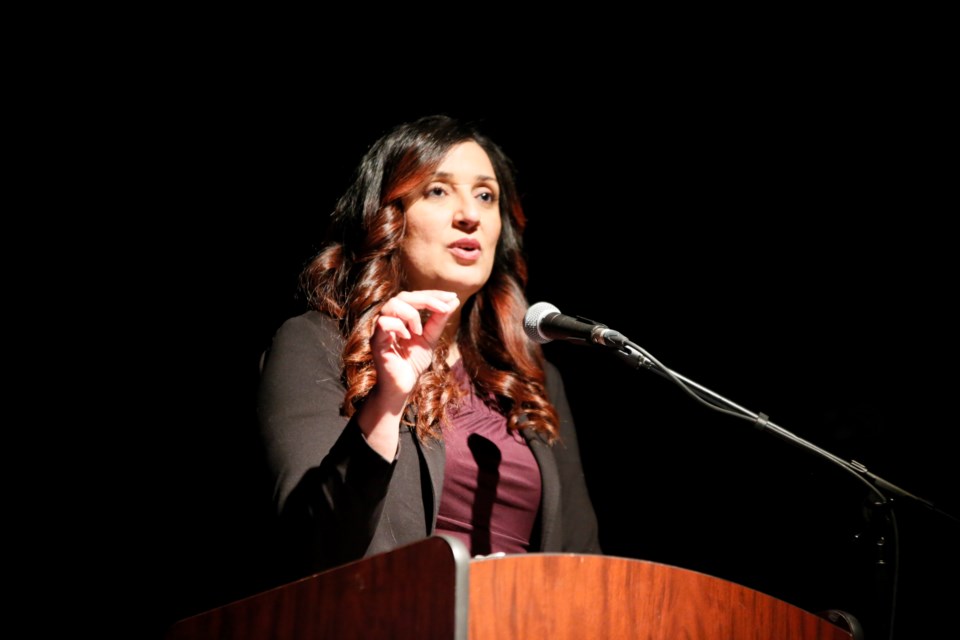Each day the world takes steps toward eliminating intimate partner violence (IPV), incremental as they may be.
On Friday night (April 5), Georgetown took a stride toward that particular goal for woman-kind and all victims of abuse. Author, psychiatrist and survivor Samra Zafar spellbound the audience at the John Elliot Theatre (JET) during Safe Haven: A Conversation on Overcoming Domestic Violence.
The intimate gathering of dozens of people was often moved to tears as Zafar shared her story.
“I heard a voice behind me, ‘Ma'am, can I buy you a coffee? Can I buy your daughter a doughnut?’ I turned around and there was a set of the kindest looking eyes. A complete stranger of a person,” Zafar said in recalling how a random act of kindness pushed her to take control of her life.
“He was looking at me with kindness, respect, empathy, sympathy, just humanity. Something that I have not been getting from people.”

Organizer Aditee Goswami created the gathering to have an atmosphere of kindness, respect, empathy and humanity to arm others so they can do the same. She brought together SAFE Halton, Halton Women’s Place, CFUW Georgetown and Halton Regional Police Service (HRPS) under the JET’s roof.
Also present were Paul Henderson and Flo Bellman, parents of Darian Henderson-Bellman, who lost their daughter to domestic violence. Halton Women’s Place dedicated purple benches to her and Sue Nesbitt-McNally in Georgetown and Acton respectively.
The goal for the evening was to share stories, learn how to identify red flags and get a better picture of the state of intimate partner violence.
“We understand the difficulties of walking away from long-standing relationships or family situations, especially when confronted with mental and physical hostility and hardships,” Goswami said in setting the tone for the evening.
"What promotes such decisions? What support system do we have? Or before and after leaving such relationships, what's next? These are complex questions and navigating life’s arrangements can be daunting.”
Zafar was brought to Canada by her now ex-husband as a child bride from her native Pakistan. She was promised an education. He broke his promise and subjected Zafar to a decade of abuse.
Throughout that period of her life, she surreptitiously got herself educated. Once she felt like there was ground underneath her feet, she left him.
Since then, she received her degree from the University of Toronto, became a successful advocate for women and the author of the book A Good Wife: Escaping the Life I Never Chose.
She founded Brave Beginnings, an organization that provides mentoring to people who have been subjected to experiences similar to hers and people like her.
Olivia Cifarelli of SAFE Halton - an advocacy group for survivors - shares much in common with Zafar’s story.
"He swooned me, he loved bombed me, put me on a pedestal, made me feel so special, but after every compliment there was an insult not too far behind,” Cifarelli told the JET audience.
The abuse worsened by several orders of magnitude until one day Cifarelli became what she described as “a shell of myself.”
Eventually, during one harrowing experience, she called 911.
“In that moment I chose I was worthy, I chose sobriety, I chose freedom and, most importantly, I chose myself,” she said. “I can honestly say that the good days outweigh the bad.”

Ultimately, in any conversation about abuse, whether IPV or other varieties, one needs to talk about available resources. Andrea Beebe-Clark educated attendees about the signs of abuse. Nervousness to speak around their partner, being sad or withdrawn, changing plans last minute, covering up physical signs of abuse and being apologetic about their partner are just some of them. Coping mechanisms involving drugs or alcohol are one of the more major signs.
“I want to provide you with something known as a SNCit conversation. That stands for see it, name it and check it,” Beebe-Clark said. “Once you've provided them and let them know that you've seen or observed, you're letting them know that, ‘hey, if you need support, I'm here for you.’”
While the difficult conversations of the night provided much comfort to those concerned with IPV, HRPS Detective Constable Patrick Froom shined a light on the work ahead. According to him, one in eight relationships have aspects of IPV in them.
"I’m sure that stat has gone up even more. I’m sure it’s more like one in five now. We see it every single day in our office,” Froom said.
In 2022, the last such available statistics, the HRPS received over 3,500 calls related to IPV, resulting in 951 arrests and over 2,300 charges.
“For my part, the conversation has been occurring for decades. But of course, the problem has been relatively recently been spoken about out loud,” Mayor Ann Lawlor said in speaking about the lessening stigma around such conversations.
“You can always count on me to be present for conversations and advocacy, which will confront domestic violence and empower women to break free and to be safe.”



